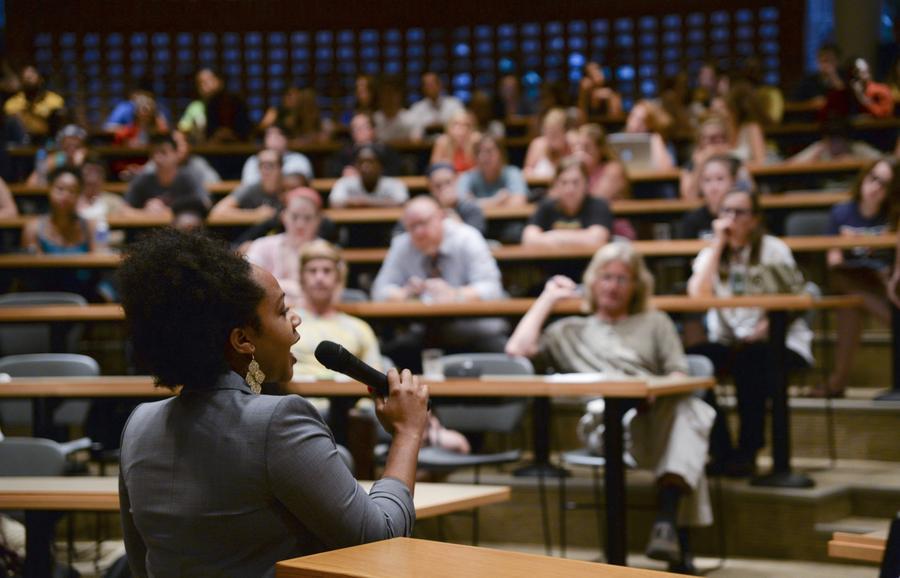
Students, faculty and concerned community members came together Tuesday evening for an open forum on Ferguson to discuss the current situation in Ferguson since the shooting of Michael Brown.
“Forum on Ferguson” took place in Hulston Hall from 6 to 7:30 p.m., and was led by Dr. Zakiya Adair, assistant professor of women’s and gender studies
Adair guided the conversation by fielding questions and comments from audience members who voiced their concerns on the Mike Brown case and its reflection on issues the U.S. currently faces with race.
Adair said the goal for the evening was to get as many voices and opinions involved to help further the role of activism at MU and within the Columbia community.
“I wanted to offer an opportunity for the community of Columbia as well as the larger University of Missouri campus to have a dialogue around not just the shooting of Michael Brown, but a dialogue about race, gender, class, community,” she said. “Hopefully, this can be the catalyst of further conversations surrounding the many issues we face today.”
Emotional students and citizens took turns sharing how they’ve felt in the past when confronted with discrimination, while attempting at coming up with plans to improve how society treats race issues today.
Questions of handling racial issues in both Columbia and nationwide arose and anecdotes of personal experiences from attendees led the discussion.
“To prevent things like Ferguson from happening in the future, people at Mizzou need to help others toward becoming just better people,” junior Byron Norman said. “With the portrayal of Mike Brown in media, people need to really learn more about what’s actually happening.”
The forum included a number of speakers who volunteered to start the dialogue for the evening, including law professors Frank Bowman and David Mitchell, Brian Houston, assistant professor of communication, Bishop Lorenzo Lawson and MU NAACP President Storm Ervin.
The conversation was held this particular Tuesday as it marked the 30-day point since the fatal shooting of Michael Brown in Ferguson.
While Brown’s death was the focal point of the forum, the discussion eventually worked its way toward a multitude of racial and social issues, including housing discrimination, militarization of the police force and living through institutionalized discrimination.
“I’m someone who thinks you do effect change by talking about difficult issues and discussing your feelings,” Adair said. “Continuing to discuss and be informed is the beginning of action, and I believe anger and frustration have a place as a motivator to actually make change happen.”
The discussion also touched upon the media portrayal of young black males and the misrepresentation of the general black demographic in positions of authority.
The public forum captivated both older community members and MU students, and some attendees said they found the forum helpful in simply learning more about current events regarding race.
“I think (the forum) is a great opportunity for people to learn more about what’s going on and be able to formulate a strong opinion, especially those unaware of the context and closeness Ferguson has,” freshman Samantha Christensen said.